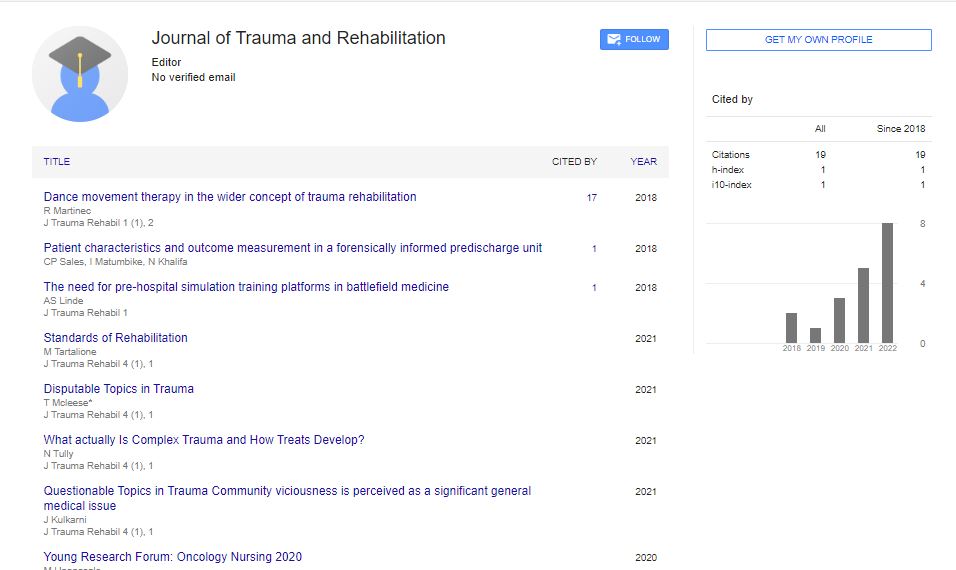Opinion Article, J Trauma Rehabil Vol: 6 Issue: 4
Exploring the Consequences of Sports Trauma in Pursuit of Excellence
Ekegren Colbenson*
1Department of Orthopaedics, University of Wansbeck General Hospital, Northumberland, United Kingdom
*Corresponding Author: Ekegren Colbenson,
Department of Orthopaedics,
University of Wansbeck General Hospital, Northumberland, United Kingdom
E-mail: ekecolb@doctors.org.uk
Received date: 24 November, 2023, Manuscript No. JTR-24-127960;
Editor assigned date: 27 November, 2023, PreQC No. JTR-24-127960 (PQ);
Reviewed date: 11 December, 2023, QC No. JTR-24-127960;
Revised date: 18 December, 2023, Manuscript No. JTR-24-127960 (R);
Published date: 26 December, 2023, DOI: 10.4172/Jtr.1000144
Citation: Colbenson E (2023) Exploring the Consequences of Sports Trauma in Pursuit of Excellence. J Trauma Rehabil 6:4.
Description
Engaging in sports is a pursuit that combines passion, discipline and dedication, often with the ultimate goal of achieving excellence. However, within the dynamic arena of sports, athletes may encounter a formidable opponent: Sports-related trauma. In the field of sports, where physical prowess and resilience are celebrated, the consequences of trauma can be profound. The physical toll of sportsrelated injuries spans a spectrum, ranging from minor strains to severe fractures and ligament tears. Athletes, driven by a desire for excellence, often strain their bodies to the maximum, increasing the risk of acute injuries during intense training sessions or competitive events. Such injuries not only jeopardize an athlete's immediate participation but can also have lasting implications on their long-term physical health. The aftermath of sports trauma is not confined to physical pain and impairment; it extends into the complex field of an athlete's psychology. The pursuit of excellence in sports is intertwined with an athlete's identity, self-worth and mental well-being. When injuries disrupt this pursuit, athletes may grapple with feelings of frustration, anxiety and even depression.
The psychological consequences of sports trauma can erode an athlete's confidence, leading to a cascade of emotional challenges that necessitate careful consideration and customized support. The pursuit of excellence in sports often involves a delicate balance between pushing physical limits and preventing injuries. Athletes and sports professionals acknowledge the inherent risks, but advancements in sports science, biomechanics and injury prevention strategies are continuously shaping the landscape. Understanding the biomechanics of movements and implementing customized training programs are integral components of injury prevention. Innovations in equipment design, such as protective gear and footwear, contribute to minimizing the risk of trauma during sports activities. In the aftermath of sports trauma, rehabilitation becomes a pivotal aspect of the endeavors of an athlete. The process is not merely about physical recovery; it encompasses psychological and emotional healing as well. Physical therapists and sports psychologists work collaboratively to facilitate recovery, addressing not only the physiological aspects of the injury but also the mental hurdles that an athlete must overcome. The rehabilitation endeavors becomes an exploration of resilience, determination and the athlete's capacity to confront and conquer adversity. Coaches, teammates and medical professionals play integral roles in an athletic approach to rehabilitation.
Athletes benefit from an environment that fosters open communication, acknowledges the emotional toll of injuries, and encourages a comprehensive strategy to recovery. In the pursuit of excellence, the consequences of sports trauma extend beyond the individual athlete to impact team dynamics and even broader societal perceptions. Teams must adapt to the absence of key players due to injuries, necessitating strategic adjustments and resilience in the face of adversity. Moreover, societal expectations and media scrutiny can place additional pressure on athletes recovering from trauma, emphasizing the need for a compassionate understanding of the challenges they face. Exploring the consequences of sports trauma in pursuit of excellence prompts a reflection on the broader culture within the sports community. Encouraging the change from a purely outcome-driven mindset to one that values comprehensive athlete well-being is essential. This change in context involves recognizing the importance of rest, recovery and mental health in the pursuit of excellence.
Conclusion
The true greatness of sports is not solely measured by victories but also by the ability to overcome obstacles, recovers from setbacks and emerges stronger both physically and mentally. The pursuit of excellence in sports is a difficult approach and sports-related trauma is a formidable adversary along this path. Understanding the consequences of sports trauma requires a nuanced exploration of its physical, psychological and societal dimensions. By recognizing the complex interaction between excellence and the risks inherent in sports, athletes and the broader sports community can forge a path forward that prioritizes comprehensive well-being, fostering a culture where both victories and setbacks contribute to the entire depiction of athletic achievement.
 Spanish
Spanish  Chinese
Chinese  Russian
Russian  German
German  French
French  Japanese
Japanese  Portuguese
Portuguese  Hindi
Hindi 